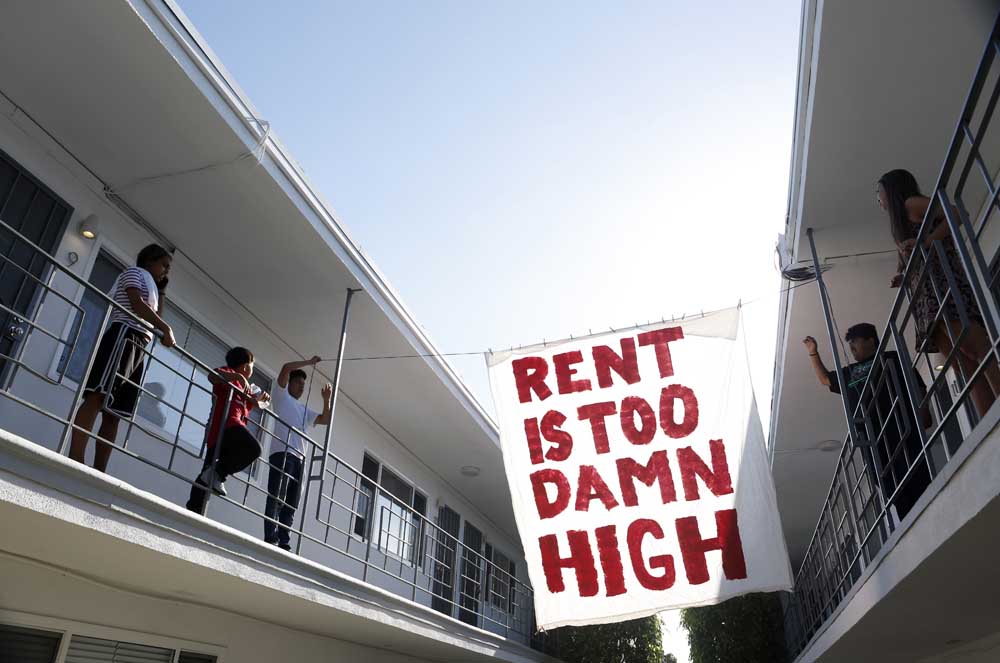California landlords prepare for new rent control law
Published 12:00 am Tuesday, October 8, 2019

- Organizers with Housing Long Beach, a local advocacy group pushing for rent control and eviction protections, hang up a sign in the courtyard of the apartment complex in October 2018 during a movie night they helped put on with tenants. (Katie Falkenberg/Los Angeles Times/TNS)
LOS ANGELES — Prominent landlord attorney Dennis Block stood before a crowd of more than 200 at an apartment owners trade show in Pasadena, California, and, to laughs, boasted of having evicted “more tenants than anybody else on the planet Earth.”
Block said he was proud to enforce what he said America was built on: property rights. He then talked about the “scourge of this new statewide rent control that is coming up” and offered some ways that landlords could evade rules that as of Jan. 1 would cap annual increases for tenants at 5% plus inflation and require “just cause” to evict.
Trending
His advice? Quickly hand out no-fault eviction notices to tenants who pay low rent or make frivolous requests.
“You don’t have to feel bad about this,” he said Wednesday at the trade show for the Apartment Assn. of Greater Los Angeles, which represents landlords. “It’s not your fault; it’s the state legislators’ fault.”
Gov. Gavin Newsom is expected to sign Assembly Bill 1482 into law this month. And while supporters celebrate its potential to stanch the flow of people who are priced out of their communities, landlords are grappling with what it means for them.
The rent-cap law covers only buildings older than 15 years and applies to single-family homes only if they are owned by corporations or other institutional investors. It expires in 2030 and won’t override stricter rent control ordinances in places such as Los Angeles and San Francisco.
How property owners react will go a long way to determining how effective the bill is in providing greater protection to tenants in California’s unaffordable housing markets.
“Merely making a passive investment in rental property has become a huge burden and risk, so owners tend to gravitate to what people like Dennis have to say in hopes that there may be some relief out there,” said Daniel Yukelson, executive director of the apartment association. “The more the government tries to corner rental property owners, the more they will, by nature, look for ways to get around those regulations in order to protect the large investments.”
Trending
Today, landlords of noncontrolled units can generally tell long-term tenants to leave in 60 days for no stated reason, as long as doing so wouldn’t break a lease. Starting Jan. 1, landlords covered by the bill will need just cause to remove renters who have lived in their units at least a year.
Block noted that any recent rent increase above the coming cap must be canceled in January. But no similar provision exists for the new just-cause eviction rules. As a result, he explained, it’s possible to get rid of low-paying tenants and significantly raise rents — landlords can charge what they want for vacant units — as long as the notice to vacate expires before Jan. 1.
Landlords are often viewed as a monolith. But there are many different types, many with their own investment strategies.
There are professional investment firms that buy buildings in gentrifying areas so they can jack up rent.
There are big Wall Street companies that, after the financial crisis created a wave of foreclosures, bought up single-family homes and rented them out.
And there are mom-and-pop investors, who might have a day job and own a handful of buildings to pay for retirement.
Yukelson and others in the industry say many small owners provide relatively affordable housing and don’t always raise the rent. But they fear that once owners realize they won’t have an option for a big increase down the line, landlords will start to raise rent more often, maybe up to the maximum allowed.
“The decision to say, ‘I am going to forgo this money this year’ is a different decision than, ‘I am going to forgo this money forever,’” said Russell Lowery, of the California Rental Housing Association.
In interviews, some small landlords said the bill wouldn’t change anything.
The law was pitched not as the ultimate solution to the affordability crisis but as a way to stop the bleeding from sudden double- and triple-digit percentage increases, as well as no-fault evictions that clear entire buildings for higher-income households.
Not everyone in the real estate industry opposed the state bill.
The California Apartment Assn. hopes it will blunt a push for even stricter regulations. Debra Carlton, the association’s senior vice president of public affairs, said the group wanted to do “our part” to improve affordability, while limiting effects on property owners.
Carlton called suggestions, like Block’s, that landlords quickly remove low-rent tenants “unconscionable.” She said that needlessly spreads fear about a state law that allows a reasonable profit and is meant to stop “gouging.”
Property owners will still be able to evict tenants for “substantial” renovations if they pay a relocation fee equal to a month’s rent to those leaving. But the renovations can’t be cosmetic, like painting.
Overall, an Economic Roundtable survey found that tenants staying in rent-controlled units for two to 11 years wound up with a smaller cumulative rent increase than tenants staying for the same amount of time in non-controlled units.
A recent study from Stanford researchers looked at rent control since 1994 in San Francisco and found that the policy kept people in their homes who otherwise would have been displaced.
But caps far stricter than the state rules encouraged some landlords to turn units into condos or demolish their properties, which the researchers believed put upward pressure on rents citywide.
René Christian Moya, campaign director of Housing Is a Human Right, said his group backs banning the removal of rental housing from the market, as well as a 2020 ballot measure to cap rents even on vacant units.
“We have to push for more” than the state bill, he said.








